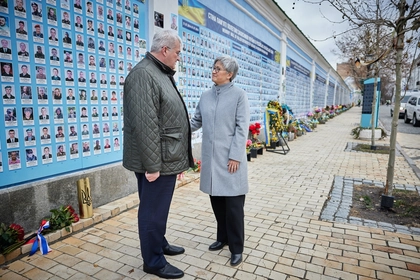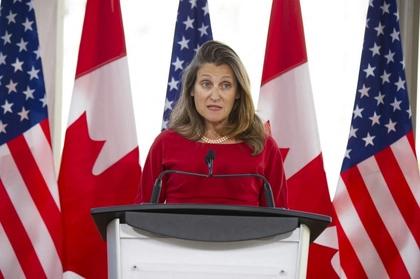Before the war in Ukraine gas prices rose steeply causing many rural residents to change to wood burning heating systems.
Even with the cost of the conversion, they were confident that burning wood would be a money saver, but recently the Verkhovna Rada voted in favor of a law that promised to make life almost impossible for most people with wood burning heating systems.
JOIN US ON TELEGRAM
Follow our coverage of the war on the @Kyivpost_official.
According to the law, if one cubic meter of firewood or more is found in someone’s yard or shed without proof that it was felled and purchased legally, the owner will face a large fine. If that wood is oak or pine, the holders of the wood could be imprisoned for 5 to 7 years.
News of the bill, which only required President Zelensky's signature to become law, sent shock waves through rural communities but, as Ukrainians woke up to the fact of Donald Trump's victory in the US Election, President Zelensky provided relief for some by announcing that he would not sign the illegal firewood bill into law.
Almost immediately, the cries in defense of the rural population were replaced by shouts of indignation over large scale, illegal tree felling and the lack of forest management in general.
During the 33 years since Ukraine gained independence, chaos and corruption have reigned in the country's forestry sector. Timber has been cut down on an industrial scale, illegally exported or ended up being sold on the domestic “gray” or “black” markets. From time to time, this problem was discussed in the press, but nothing changed. Against this background, ordinary Ukrainians realized that forests have no owner, which means they belong to everyone.

Australian Foreign Minister Visits Kyiv, Confirms Reopening of Embassy
Very soon Christmas tree markets will appear all over the country. Some will offer legally felled trees, while others will be selling trees that were cut down illegally and brought to the market by those who want to make quick money.
For some years, NGOs have organized campaigns to raise awareness of the dangers of deforestation and to convince Ukrainians to buy only legal trees marked with bar codes, the money from which goes to forestry enterprises which manage the forest and pay taxes. These campaigns have had some effect and city residents are more likely to buy legal Christmas trees.
The situation with firewood, however, has always been more complicated. Buying it through official channels is generally accompanied with impenetrable bureaucracy.
“I recently tried to buy firewood for my dacha through official channels,” says Viktor Kozhevnikov a well-known actor and the Director of the Joyfest theater festival.
“I arrived at the forestry department and waited for the boss for three hours. He came, made a photocopy of my passport and told me to come back the next day. When I returned, he said that the lumberjacks and timber handlers had not shown up for work. They were probably hiding from the military enlistment squads. So, there was no one to chop firewood. He pointed to an old pear tree in the courtyard and suggested that I cut it down myself and take the wood home."
Stories like this have resulted in the development of a huge unofficial firewood market. Along the main roads on the approach to every town, trucks stand with billboards advertising "firewood for sale."
Anyone preparing for the winter, simply agrees on a price with the driver of one of these trucks who then brings the firewood straight to the buyer’s home.
In some areas, however, the firewood sector of the timber industry is relatively well organized. Larisa Pokalchuk: co-founder of the documentary film studio “Babylon-13” bought firewood from the Boryspil forestry office and discovered that legal firewood was actually two and a half times cheaper than the illegal wood.
With the winter approaching, the cost of heating in both urban and rural areas is one factor convincing internally displaced persons to return home. In recent months, more than 120,000 of them have returned to the occupied territories. Some have even gone back to areas that are still combat zones.
The state has reduced some types of assistance to internally displaced persons and has not been able to provide them with housing. It is not always easy for IDPs to find work in a new place. Also, the state assistance program for internally displaced persons does not include compensation payments for housing that has been destroyed, damaged or abandoned because of occupation.
At the same time, the Russian authorities in occupied areas have increased compensation payments for destroyed or damaged housing. In order to receive this compensation, property owners must accept Russian citizenship. Then a long, bureaucratic process begins, at the end of which compensation may be forthcoming – for example 4 million 500 thousand rubles (46,000 US dollars) for a destroyed house of 100 square meters.
Since November last year 320,000 internally displaced persons have tried to return to the occupied territories through Moscow. 200,000 of them were refused entry to Russia. They were forced to return to Ukraine or become refugees abroad.
There are officially more than four million internally displaced persons in Ukraine today – four million people in hardship situations who, to a greater or lesser extent, rely on woefully inadequate state assistance programs. What is more, the number of IDPs may continue to rise due to the Russian army’s ongoing offensive in the Donbas.
As Ukrainians greet the first snow, we know that winter has already begun, and it promises to be cold and hard. President Zelensky's refusal to sign the firewood bill is good news for many rural dwellers, but the price of firewood will increase, and the size of Ukraine's forests will continue to dwindle.
The views expressed in this opinion article are the author’s and not necessarily those of Kyiv Post.
You can also highlight the text and press Ctrl + Enter






